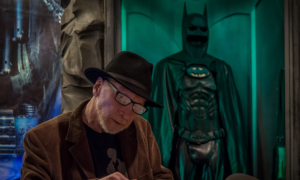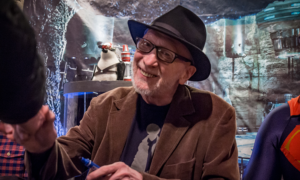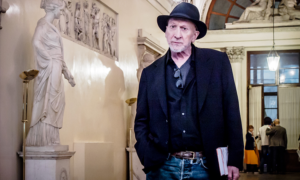Directed by Silenn Thomas (300), Frank Miller – American Genius follows the near half-century career of the legendary comic book writer/artist Frank Miller, through his small-town beginnings in Vermont all the way to New York City, Hollywood, and beyond.
Now, after over four years creating the documentary, it is showing at this year’s Lucca festival, where we caught up with Miller and Thomas to talk about looking back on an astonishing career so far…
How has it been looking back on your career for Frank Miller – American Genius?
Frank Miller: Well, Silenn has made it shockingly easy! She’s done all the artwork, she’s done all the organising and I get to just sit here like a stupid guy and react.
But no it’s been actually been quite stimulating because there have been many questions and many searches of memory. Every once in a while someone will pull up something and I cannot believe I did it! Particularly when we were at my brother’s home. He’s almost like an archivist in that he had a whole display of work that I did when I was in my very early teens. He had kept it all very safe and to see it was… I mean, the funny thing was, I had forgotten I’d done a great deal of it but as soon as I saw any of it, I instantly remembered the moment I drew it and what was what my life was like, everything.
Silenn has dug so deep. I would say it’s brought me all the pleasure of witnessing my own autopsy!
Silenn Thomas: Ah, you mean like you were floating from above, watching?
FM: No, no no, I was lying there and there are people with mirrors on their heads cutting my stomach open and pulling things out. It’s like the end of an Outer Limits episode: “Oh no! I’m still alive! But I can’t move, I can’t see! They don’t know!” [haha]

Silenn, how did this start for you?
Silenn Thomas: Well, I don’t read comics (maybe I will now!) but I met Frank on 300.
I was living in London at the time and American producer Mark Canton said ‘don’t stay in England your bones are gonna liquefy, it’s too humid out there. Come back to Hollywood’ and so my deal with this producer was like ‘okay, fine, but I will be an executive and a producer on everything that I advance to production’ and he said ‘okay, fine, we’ll give you a slate of movies’ and on it was 300.
I didn’t know the comic and I had studied the Battle of Thermopylae in high school. So I was like, ‘I know what this is, this is the Battle of Thermopylae’ and all the guy executives were like ‘Oh, whatever, she’s French’ [but] I got that project, and then Frank was such a gentleman…
FM: That was after I said: ‘Well, whatever, she’s French!’ haha!
ST: [Laughs] We got Zach [Snyder] and this whole creative process was starting and I realised Frank was the author. Then I discovered this whole connection with Batman and American comics and we stayed in touch. I kept saying ‘hey, I really want to work with you’ and so over the years, I was always hearing ‘you tell us he’s interesting, but there’s nothing about him. There’s a documentary that needs to be done.’
Then timing finally came together where I asked him and he’s like, ‘okay, but only if you do it’. So that started this four-and-a-half year odyssey. The journey is as intense as is his epic career and his epic talent!

You’re going to be showing this documentary at the Lucca festival. What’s it like being able to see fans in person again?
FM: I couldn’t be more excited. It’s just wonderful. Silenn can tell you that I’m not shy! I really enjoy contact with the whole world of comics and the people in it. The other artists and everybody and so I expect this to be nothing a joy.
ST: [This all] actually started in Lucca – it’s completely insane that we’re presenting it in Lucca now, after (or still) in a pandemic/endemic with people that are going to watch it.
Is there a particular moment of the documantary you’re excited for audiences to see?
ST: For me, again not coming from the comics, and tying it to when I was in London, there was such a music scene when I was there: Chris Cunningham, Aphex Twin, Tom Jenkinson, Squarepusher, and there’s a piece in the documentary that is honouring one of his characters that I think is a little bit Frank, a little part me: Carrie Kelly.
There’s also a bit that we animated with these crazy Brazilian artists and with Tom Jenkinson’s music that he did for the movie. So I’m so proud of because it’s like a connection of form and storytelling form and it honours Frank in so many ways.
FM: There are a couple of things that come to mind on what I look forward to the most really. One is the give and take you’ll see among comic artists with each other. Where you’ll be amazed at how much we make sound effects as we’re talking and how we really are like little kids. Like with Andy Kubert, or with Brian Azzarello, you see that we’re making swooshing sounds when we’re talking about Superman, all of that.
I’ve got to say that, what I’ve seen in the documentary is that it shows some wonderful looks at the fans, their costuming, their energy, and enthusiasm. It’s through them that you really get a sense that this is not a bunch of lofty authors and an audience. This is tribal. People have different roles within the tribe, but it’s all around a sense of fantasy that embraces everything – from the whole variety of different kinds of comic books to Star Trek to Jurassic Park. Particularly Star Wars, which is the culmination of all things fantastic. All these things are of a piece. I like to use the word mythology. Because I think that word applies to everything from Star Wars to Sin City. Much as some of them are dressed up and try to sound realistic, but it’s all fantasy!

Frank, you’ve been in the comic book industry for a while! Has it changed much in that time?
FM: It’s profoundly changed and all for the better!
When I first came in, the industry had not changed since the 1940s in that people like me were hired hands who are very replaceable, with a few exceptions. But comic book people were all replaceable. It was only people in newspapers like Will Eisner who were able to own their own work and control that space. So there was not a lifelong investment of the type that one gets when one is acknowledged as the creator of it. There was a lack of self-love that was ingrained into the talent and into the publishers as well.
When a comic book writer would get to publish a prose novel, we would say, ‘okay, he’s better than any of us now, because he published a book that didn’t have any pictures in it’.
It was self contempt. It was deep and abiding, and now we’ve come into our own. We really do feel like we’re a part of culture and certainly, a huge part of our culture now. Now it’s something that you can see that people can actually raise their kids feeling like it’s a good thing to be doing.
The artist Joe Kubert, the great American comic book artist, broke the mould in two ways. One is that he opened the first American school teaching the craft of comic book art. Second, he raised a whole family of wonderful, robust kids to become artists in the field!
ST: Emma Kubert is now teaching at the school!
FM: And the thing is, they’re all really good at it. We now have a second and third generation coming up. For me, it was a call. No one in my family had ever done anything that resembled it. It was as if a voice from the heavens spoke. So I had to do this. In fact, I knew I’d never be any good at anything else.
Legendary creator Frank Miller is attending Lucca Comics & Games 2021 for the presentation of the documentary ‘Frank Miller – American Genius’. Main Image Credit: Tula Lotay
